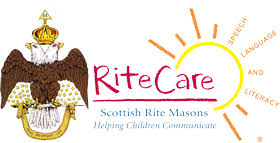6:30 pm: Stated Meeting
–
July 10, 2025


Scottish Rite Masons Helping Children Communicate
RiteCare® Clinics accept preschool children who have difficulty speaking or understanding the spoken word or school-age children who have difficulty learning to read.
RiteCare® Childhood Language Program
In the early 1950s in Colorado, the Scottish Rite of Freemasonry of the Southern Jurisdiction of the United States initiated a program to help children with speech and language disorders. The results obtained from this program led to the establishment of RiteCare clinics to provide diagnostic evaluation and treatment of speech and language disorders, as well as learning disabilities.
Today, there are 178 RiteCare® clinics, centers, and special programs operating or planned for children and therapists located throughout the United States. Each facility is staffed by speech-language pathologists or other trained personnel. Through the support of Scottish Rite members, these clinics, centers, and programs continue to increase. The value of this philanthropy has long been apparent. Tens of thousands of youngsters across the United States have been helped significantly. With the good work of dedicated clinicians and parents, the Scottish Rite has achieved successes that could only be imagined a few years back. Children who might have remained educationally behind for a lifetime can now talk, read, and lead productive lives.
Program Eligibility
As a rule, the RiteCare® Clinics accept preschool children who have difficulty speaking or understanding the spoken word or school-age children who have difficulty learning to read. Some centers also offer literacy training for adults. Inquiries on age groups and program offerings in specific areas should be addressed to the director of the local Scottish Rite facility. Equally important, all services are available regardless of race, creed, or the family’s inability to pay. While all children in need are eligible for available RiteCare® Program treatment, please consult with your local facility for specific financial information.
How to Identify Speech and Language Disorders and Associated Learning Disabilities
Children who have these problems are sometimes hard to detect. As noted before, there is a wide age range for children to begin talking. Parents may become concerned later than desirable, may not recognize, or may misinterpret the symptoms. These children are often slow in developing a vocabulary or are difficult to understand, using incomplete or incorrect sentences or gibberish.
They may have difficulties with attention, memory, or word retrieval. They may be slow in processing auditory information. There are many technical diagnostic terms for these problems, and some of them can sound terrifying to parents. However, parents must remember that many of these dysfunctions do not mean mental deficiency or emotional disturbance.
The Importance of Early Evaluation and Treatment
In the past few years, there has been increasing recognition of the importance of evaluating and treating childhood problems at the earliest possible stage. The chances of a child with a communication disorder attaining his or her peer group level are much greater if the child receives help at an early age.
What to Do if a Parent Suspects a Child Needs Help
A parent with concerns about a child’s language or learning ability should call a RiteCare®Clinic, Center, or Program for guidance or contact appropriate municipal or state organizations. The first step is a complete evaluation of the child’s condition by professionals. In most instances, a child identified as having a communication disorder can be helped by the Scottish Rite. However, a child who demonstrates overall developmental delays or severe handicapping conditions may require other forms of treatment, such as physical therapy or a full-time special education program. Any of the trained speech-language pathologists at the RiteCare® clinics and centers can recommend programs specializing in advanced treatment. These facilities generally are located in or adjacent to a Scottish Rite Temple, and the clinics may be associated with major hospitals or universities in the area. All are clearly identified in the telephone book and are known to health-care and education professionals in the areas in which they are located. The main thing parents should remember is to seek help as soon as possible if there s any indication that the child has a problem.
Kentucky Locations